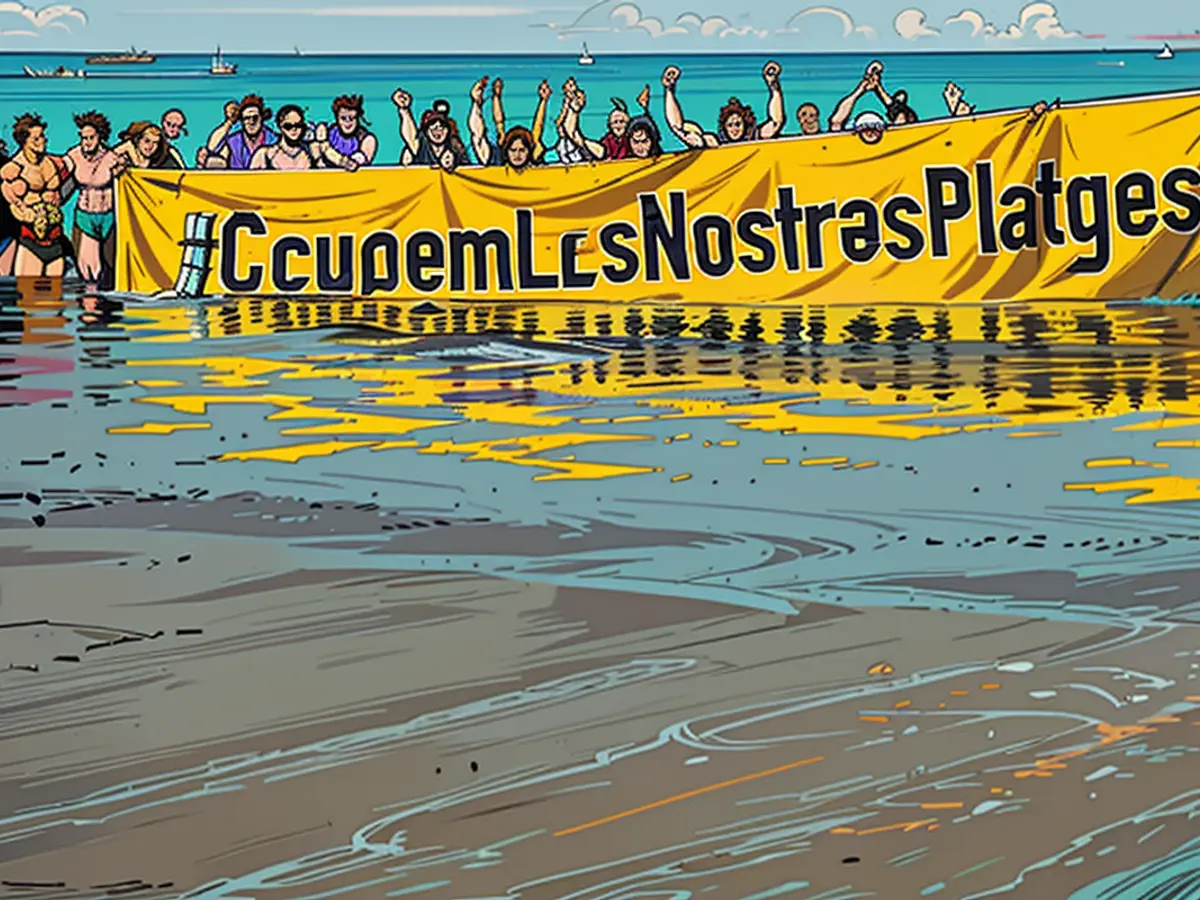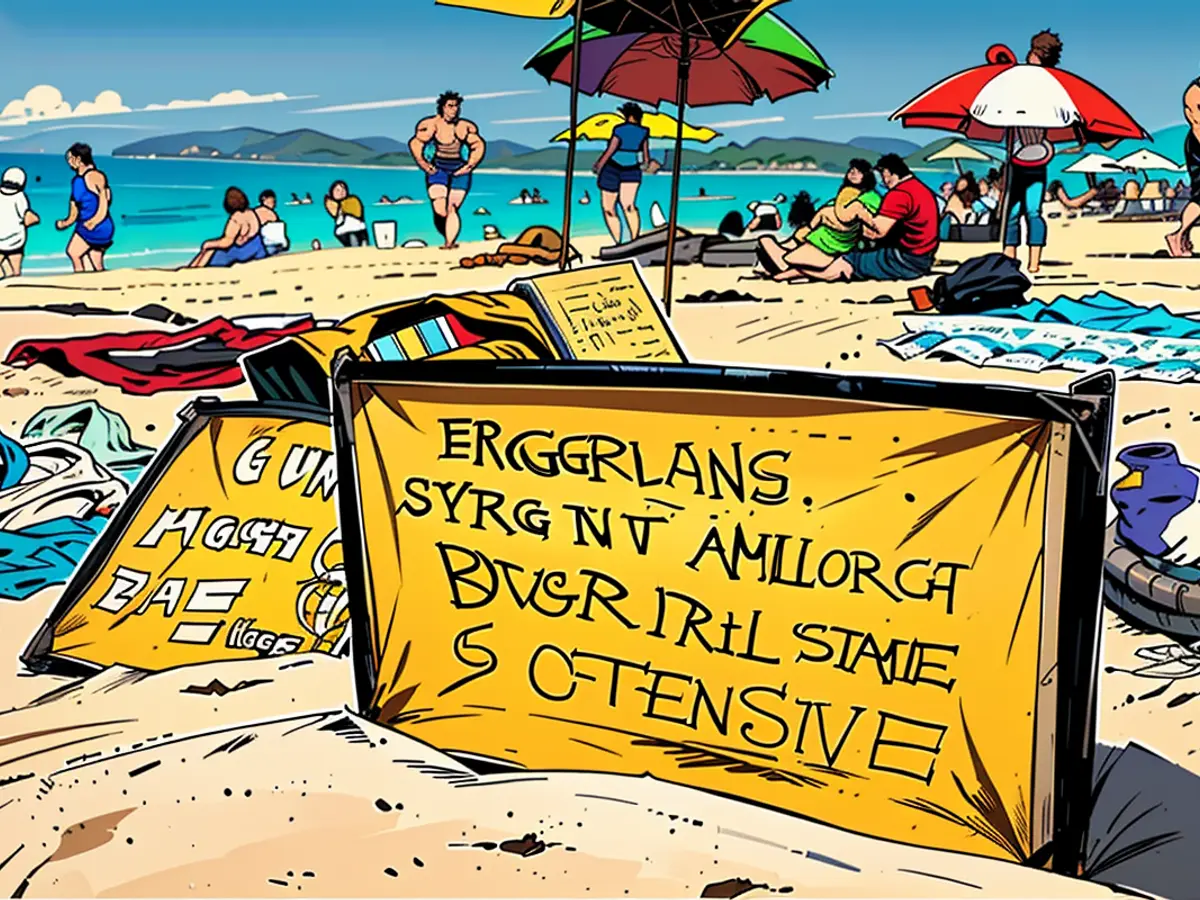Protesters occupy beach at Ballermann
Tourism in Spain is booming, but locals are complaining about high living costs and rising rents due to the influx of tourists. In protest, demonstrators on Mallorca "seized" the popular Ballermann area, beloved by Germans.
On Mallorca, locals once again demonstrated against mass tourism. Around a hundred people symbolically "occupied" the beach of the Ballermann, which is particularly popular among Germans. "It's about raising awareness that Mallorca is simply too crowded," demonstrator Reyes told "Mallorca Magazine". Her colleague Eric added, "We need to finally set a limit to mass tourism on the island." The demonstrators gathered on the beach and then ran into the sea, where they unfurled a banner reading "Let's occupy our beaches."
Berliner tourist Marco understood the action, despite being slightly puzzled by a "Tourist-go-home" sign, the "Mallorca Zeitung" reported. "I haven't done anything wrong. I like coming to Mallorca, and Mallorcans are welcome to visit Germany too," he said. Another German tourist turned up his German pop music, saying it was a "counter-demonstration."
A small but loud minority
This is the third such action on the island this year. In May and June, tens of thousands of people demonstrated peacefully in Palma against the excesses of tourism. Similar protests have taken place in other Spanish tourist hotspots. Critics complain mainly about high living costs and the lack of affordable housing due to the mass influx of tourists.
So far, the demonstrations have been peaceful, with the worst incidents being tourists or locals being squirted with water pistols in Barcelona. On Mallorca, some tourists even supported the demonstrators.
However, slogans have now appeared on walls that are difficult to stomach. "Kill A Tourist" reads one in Manacor, and another in Palma reads "Tourism makes you free" in German, apparently a reference to the cynical Nazi slogan "Arbeit macht frei" over the gates of concentration camps, as reported by the "Mallorca Zeitung". Tourist associations on the island are quick to distance themselves. "It's a tiny minority making a lot of noise," a spokeswoman for the hoteliers' association FEHM told the paper.
While opponents of mass tourism are not responsible for such graffiti, they welcome its effect of unsettling tourists. "That's exactly what we want to achieve," said Pere Joan Femenia, a spokesman for the "Less Tourism, More Life" movement, told the paper. "It's clear that this doesn't please everyone, but if we want to achieve something, we apparently have to use clearer words."
Tourists are tightening their belts
Comedian Tom Gerhardt told "Der Spiegel": "Imagine if the citizens of the tourist hotspot Rothenburg ob der Tauber went out onto the streets against Americans or Japanese. That would be a case for Interior Minister Faeser, and there would be a counter-demonstration for more diversity." Gerhardt's film "Ballermann 6" has shaped the image of the island to this day.
Despite protests, the tourism industry in Mallorca is facing another concern. While around 500,000 more visitors arrived on the Balearic Islands, with Mallorca being the main island, by the end of June compared to the same period in the record year of 2023, the "Mallorca Magazin" reported that money is not as loose as before. Savings from the COVID-19 pandemic have been spent, and higher flight and hotel prices are putting a strain on vacation budgets. This is affecting taxis, car rentals, restaurants, shops, and tour operators, with these sectors reporting a decrease in turnover of 15 to 20 percent.
The Balearic Islands are home to approximately 1.2 million locals. According to figures from the Spanish statistics agency INE, the islands were visited by 18 million tourists last year, with 4.6 million from Germany and 3.4 million from the UK. For Mallorca, tourism is crucial for its economy, accounting for 45 percent of the island's GDP.
Despite the economic importance of tourism, local resentment towards the industry's impact on living costs and housing affordability continues in Spain. In response, 50 protesters in Almería recently marched through the city center, calling for a "tourist tax" to address these issues. Spain's Minister of Tourism, Reyes Maroto, has acknowledged these concerns and has proposed changes to promote sustainable tourism and benefit local communities.







